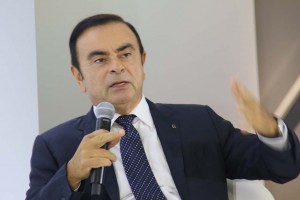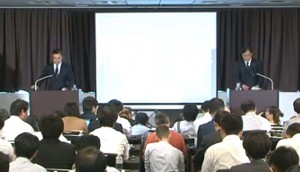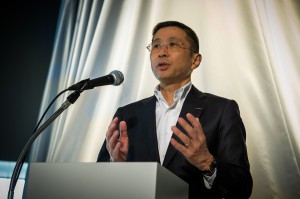
Nissan Chairman Carlos Ghosn was arrested by Japanese investigators and is being held during the query.
Carlos Ghosn, until recently one of the most powerful men in the global auto industry, suffered yet another setback on Monday, the board of Mitsubishi Motors ousting him as company chairman.
The news comes while Ghosn remains in custody, prosecutors in Tokyo probing allegations that the 64-year-old executive under-reported his income while also misusing potentially millions of dollars in funds while serving as chief executive, and later chairman, of Nissan Motor Co. Nissan severed ties with the executive last Thursday in response to an internal probe that raised concerns about Ghosn’s alleged misdeeds.
But some observers are questioning why Ghosn was not only fired from both Nissan and Mitsubishi, but also arrested after landing in Tokyo last week. Such concerns were escalated by comments made by Nissan’s current CEO and Ghosn rival, Hirota Saikawa, who reportedly told employees on Monday that Ghosn had become too powerful in his multiple roles with Nissan, Mitsubishi and their French alliance partner Renault.
It was the latest in a series of strongly worded comments by Saikawa who told reporters at Nissan headquarters in Yokohama a week ago that, “I feel strong anger and disappointment,” about the results of an internal corporate investigation that allegedly revealed that Ghosn under-reported his compensation during a period of five years by 5 billion yen, or about $45 million. It also indicated Ghosn used company funds for the purchase of homes in Rio de Janeiro and Beirut.
(Ghosn scandal could fracture Renault-Nissan Alliance. Click Here for the story.)
The Brazilian-born Ghosn was arrested last Monday after returning to Japan and remains in custody as prosecutors investigate the allegations. If charged and subsequently convicted, the potential penalties could include up to 10 years in prison.
Saikawa succeeded Ghosn as Nissan CEO shortly after the second-largest of the Japanese automakers purchased a controlling stake in struggling Mitsubishi in 2016. Speaking to reporters after the smaller carmaker ousted Ghosn as its chairman, Mitsubishi CEO Osamu Masuko said the move was “unavoidable,” though it was also “an agonizing decision.” He added that, “The priority was what to do to protect the company, what to do to protect our employees and their families.”
It’s unclear what Ghosn’s ouster will mean for the three-company alliance though, in a partial transcript of his Monday comments to Nissan employees obtained by the Wall Street Journal, CEO Saikawa said that with Ghosn gone, Nissan will be able to “ensure autonomy.”
That appears to address one of the big concerns that has divided the European and Asian sides of the Renault-Nissan-Mitsubishi Alliance. Facing pressure from the French government, which holds a 43.4% stake in the company, Ghosn has been looking at the possibility of consolidating the three automakers. While they have cross-holdings and coordinate many operations, including product development, Renault, Nissan and Mitsubishi currently operate as independent companies.
(Click Here for more about Ghosn’s views of a possible Renault takeover of the Alliance.)
“I don’t want to say ‘the plot was hatched,’ but I wonder if (Nissan’s Japanese management was) willing to look the other way as long as things were going smoothly,” said Joe Phillippi, head of AutoTrends Consulting, “But things may have changed when Ghosn started talking about putting all three companies together.”

Ghosn with Mitsubishi's Chairman Osamu Masuko during the news conference announcing Nissan's investment.
Several sources within the alliance have echoed Phillippi’s concerns, one asking why Ghosn was arrested, rather than just fired, as has happened with a number of other senior automotive executives in recent years who were accused to being loose with corporate expense accounts.
Whether politics actually came into play in the Ghosn affair is far from certain, but there is no question that he was a totem representing some long-standing issues concerning the Japanese side of the alliance. Among other things, he was seen as a micro-manager by Saikawa and his team who were often required to communicate through Ghosn rather than having direct discussions with counterparts at Renault about business issues.
There was also a concern that Nissan was being treated as something of a second-class corporate citizen. Renault bailed out the then-failing Japanese automaker in 1999 and, under Japanese law, holds a controlling stake in the company. Nissan, however, has only a 15% hold on Renault. Three years ago, the two struck an agreement that was meant to serve as what Saikawa then called “deterrence,” putting restrictions on the French government’s role in the alliance.
(Ghosn could be detained up to 10 days without charges. Click Here for more.)
But the possibility of having Renault try to fully take over Nissan has remained an issue that Saikawa has actively worked to prevent.

